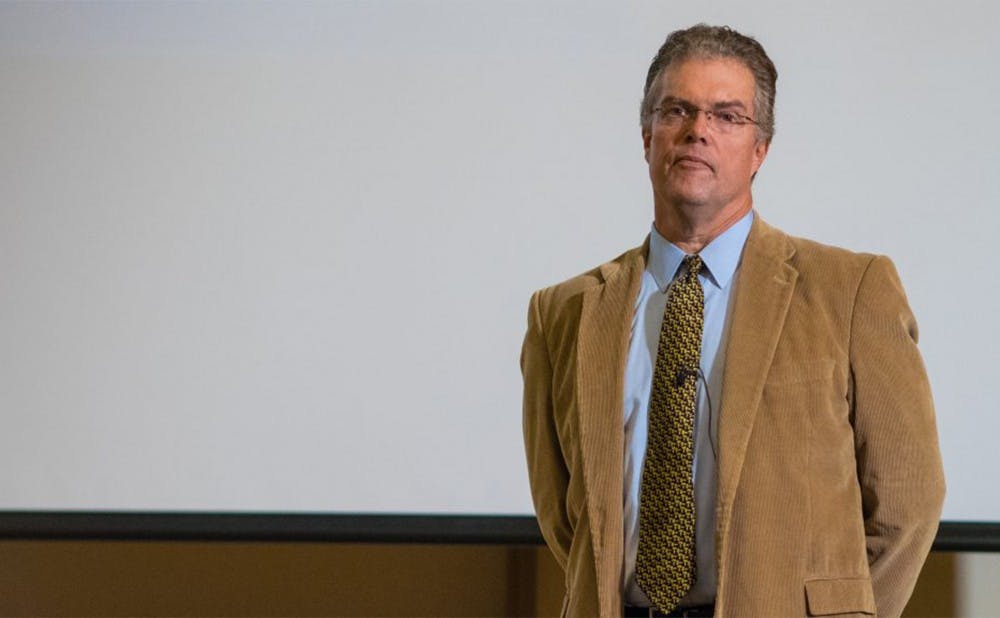Michael Munger, professor of political science and director of the Philosophy, Politics and Economics certificate program, sat down with The Chronicle to discuss the immigration ban, anti-intellectualism and government spending during a conversation about the new Congress and the Trump administration.
A podcast of the full conversation, which also includes comments from Chris Simmons, associate vice president in the office of government relations, is included below.
Here are some highlights from Munger’s responses to The Chronicle's questions:
On Trump’s executive order regarding immigration:
“[The Trump administration] may have been taking a position so that they could walk it back. It also may be that President Trump thinks that he’s carrying out a promise that he made during the campaign that was a big part of the reason that he won. In 2009, Barack Obama said, 'elections have consequences and I won,' and no one on the left then objected because they agreed with it. We’re paying the price now of having for 16 years basically eroded the rule of law and allowed presidential executive orders to substitute for laws. And now we’re looking for ways around it, and it would've been better if we had done it when President Obama did it. But we agreed then, and now we’re in the position of being hypocrites.”
On anti-intellectualism and diversity at Duke:
"I think it’s a mistake to say that the Trump campaign was anti-intellectual. There’s an element of that, but there’s something larger going on. Trump saw himself as fighting the establishment. First, the establishment in the Republican party and then, I think sort of unexpectedly, the larger establishment. I don’t know that he expected to do so well, and certainly not to win. So universities by their nature are elite—we hope we’re a meritocracy. But universities have also become a set of institutions that are separated by economic class."
"Nick Carnes, who is a professor here at the public policy school at Duke, has done quite a bit of research on the difficulties that upper-class people have connecting, whether in universities or in politics, with the concerns of middle-class people. I think universities have a lot of work to do, and to be fair, we are doing some. We’re trying to attract students who come from a diversity of economic backgrounds, not just a diversity of races. But Nick has said this, I’ve said it in some places also, in terms of class, we just don’t have a very diverse faculty. I don’t think our concern should be the kind of diversity of hues, but of views. Having everyone be different colors and having everyone have the same perspectives and experience is a mistake. But I think we’ve made quite a bit of progress on that, and that’s something Duke is committed to. I don’t think we’ve done a very good job of making that clear to outsiders though. And it’s not the fault of our government affairs office."
"A lot of the reaction I’ve seen of the Trump supporters have been caricatures of the white privilege view. If you’re a lower-class person who lost your job and didn’t get to go to college, you don’t feel very privileged. While it’s true there are a lot of discriminatory policies and implicit things that minorities face, but the middle-class Trump voters see themselves as being oppressed by a set of policies and condescended to by a set of institutions. So it’s not anti-intellectualism, it’s something larger and it’s a fight between what sort of establishments are going to be respected and what type of things are we going to emulate as worthy of admiration. And I think universities have to work harder to connect with that zeitgeist."
On how the University can play a leadership role:
"One thing I think universities can do is play more of a leadership role in explaining why it is a number of government functions are important, and we’re doing a pretty bad job of providing that information. So I think if you were to ask people, has the number of people working for the federal government gone up or stayed relatively the same for the last 20 years, there’s this perception that there’s been a huge increase in employment in the federal government. And actually, if you take out military and health care, we have straight-up fewer, not per-capita, but straight-up fewer workers in the federal government than we did 20 years ago."
"The government is perceived, right or wrong, as being intrusive, as asking too much information and as regulation writ large. A lot of this stuff was layered on and lot of it was done in pretty good faith. We’re trying to have compliance, we’re trying to have reporting requirements, but a lot of them were either redundant or contradictory. And a lot of money that we’re spending in the federal government is actually being used on those sorts of compliance costs and in the getting of grants. I’ve worked a couple of times for the National Science Foundation and other funding agencies. There’s a whole lot that universities can help do about making the government both more efficient and more effective. I think it’s a mistake to think of there being a dimension of more government or less government. What we should do is participate in our area of expertise of making sure that government does a better job of doing those things they should be doing and explaining why they should be doing these things."
Get The Chronicle straight to your inbox
Signup for our weekly newsletter. Cancel at any time.

